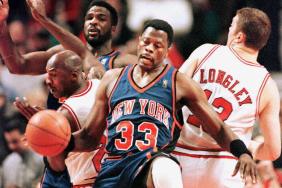
CraveOnline: Working of your hospital debt is a pretty good idea. When did they do away with that?
Jack Amiel: They haven’t. People are still working off their hospital debt.
But at the hospital?
Jack Amiel: No, not at the hospital. But we still live in a country where people are bankrupt because of a hospital bill.
That’s why I’m thinking I’ll just work it off at your office.
Jack Amiel: Exactly. Like, you can’t pay for your meal, you wash the dishes in the back. I don’t know when. I really don’t. That’s probably something our medical expert would know or that we can find out, but it was alive and well during this era.
Can you explore diseases that have long been eradicated since medical shows on television have existed?
Jack Amiel: Absolutely. We discuss things that can easily be handled with a dose of antibiotics, or with an understanding of different medicines. Remember, there are a lot of sanitation born diseases. Tuberculosis, cholera, bubonic plague, typhoid, a lot of these are diseases that people thought the poor got because the poor were weak. They were weak in constitution. Yet, it really was a function of the fact that they were living in tight quarters without ventilation and they were living in places with poor sanitation.
And the wealthy who weren’t getting as many of these diseases were uptown. They were in brownstones above street level, above the manure, above the sewage. They didn’t live in close quarters. They had ventilation so amazingly, they weren’t getting a lot of these diseases that the people downtown were getting and they thought it was certainly due to their wonderful constitutions and their superior breeding.
Michael Begler: I always thought it was interesting when we would read these medical journals, that when they would describe a patient, the two things they would always talk about up front were did they have syphilis or were they alcoholics? So that just shows how prevalent syphilis was back then and alcoholism. Was it inherited? Does their family drink? Is there a history of syphilis in their family? How is that going to affect their medical treatment? They would base it on some of those facts and those diseases.
Is it safe to say that cocaine does not give Thackery super medical powers like Vicodin did for Dr. House?
Jack Amiel: No. What it gives him is stamina. It gives him stamina and courage, and the ability to block out what has come before that’s painful. He’s a main in constant propulsive forward motion and cocaine helps someone stay that way. To cut into someone knowing that you’ve failed at this surgery 20 times, or 10 times but it’s never succeeded, you need a level of courage that I don’t possess, I don’t think most people naturally possess.
But if you’re coked up and you’re full of confidence and you’re pushing forward, you can do that and a lot of those doctors needed cocaine to push forward, because it’s inordinately painful to realize what your body count is as a surgeon and to keep moving forward going, “If I can solve this, if I can solve this, if I can solve this…” I think that’s part of it, I think the courage and the energy.
The doctors of this era who were on cocaine would lock themselves away for weeks, days on end and they would experiment. Suddenly they would come out of the pathology lab with some incredible new breakthrough. Everyone would go, “He’s inexhaustible.” A lot of it was cocaine fueled and then they would crash, but it was unsustainable. That’s the thing. Every doctor in this era eventually could not sustain, whether it was the balance of the cocaine and the opium or the cocaine and the morphine, they couldn’t sustain it. Eventually it would crash and they would start all over again.
Will we see more flashbacks with Matt Frewer?
Michael Begler: Oh yeah. Christenson plays a role throughout the entire series. We really get to understand the history of these two men, their relationship, when they first met and what they did together, the breakthroughs that they had. And really, the closeness that they had, which is really important. As Jack was saying, for Thackery to try and not dwell on that past even though it’s haunting him.
Jack Amiel: And the thing that you see in the second episode is Thackery explains about Christenson, Christenson started seeing the patient. He stopped blasting forward. He stopped looking forward and he began to wallow. When he began to wallow, he lost it. Once he started feeling the pain, and the cocaine could no longer keep him inured from the horror of the fact that these people were involved in a very bloody business to try to move medicine forward, he took his own life. Thackery’s now looking at that going, “Is that the object lesson? Is he the cautionary tale? Is this going to happen to me?”
In his eulogy, he says, “Why have I not lost hope like Christenson has? Because I believe in technology. I believe in the future.” And he’s willing himself to believe that. Matt plays it beautifully. Matt Frewer was fantastic. He came in and he just crushed it. We were so sorry to have killed him so soon because once you saw how fantastic he is, we were like, “We want more of him.”
Me too, that was the doctor I wanted to follow, so I’m glad he’s still in flashbacks.
Jack Amiel: He’s great. Matt is fantastic. He’s a really good soul.
Did you have limited access to Matt because of “Orphan Black?”
Jack Amiel: No, I think we can get him if we want.
Michael Begler: We got him for as much as we wanted.
Jack Amiel: We never had restrictions. The truth is, in a different universe we would’ve followed Christenson.
Was the new doctor named Algernon for literary reasons?
Michael Begler: No, you mean like “Flowers for Algernon?” No, it was totally just a name we thought worked for the era.
Jack Amiel: Part of the fun of this is naming everybody because there are great names from the era. We’re just trying to make everyone’s name, and since there are so many characters, you want their names to be unique so people can follow. If it’s Larry, Pete, Steve and Joe, the problem is, “Which one’s Larry?” If you give them kind of a grand name, it helps you remember which one is which.
Was Thackery not inspired by the author either?
Jack Amiel: Well, he’s spelled differently. That was done very specifically, because Thackery is an American creature. William Makepeace Thackeray was a Brit and sort of a quintessential Brit. One of the things I wanted to make sure of was that his spelling was some sort of Americanization of that. He is an American creature. This is a guy who’s reckless and a product of a country like America, a wild west country. So no, he was not inspired by that. He was inspired by the idea of taking something from the old world and making it his own in America.
Up to what year do you think “The Knick” will go?
Jack Amiel: As far as I’m concerned, yesterday. It is such a rich era, with so much going on.
Michael Begler: And year by year, there’s so much change. Once you get into 1901, there’s great leaps that didn’t happen in 1900, especially in the medical world. So I think we feel that because the world is changing so fast in that era, we could keep going and going and going.
Do you think each season would be a year, or even two or three seasons per year?
Jack Amiel: I think we want to go year by year until maybe getting a little more distance. 1901 is a fascinating year as well. The president is shot. Spoiler alert, the President of the United States gets shot. McKinley is shot up in Buffalo at the Pan-American Exposition and in comes Teddy Roosevelt, and he’s the first modern president with a bully pulpit and extending U.S. power around the world. It’s a very interesting era. Everything changes. Suddenly cars are about to become affordable. Suddenly technology is in the home.
Michael Begler: A subway is being built in New York.
Jack Amiel: Suddenly people are moving up and down and around. Things are being electrified, so you’ve got this incredibly quick moving era. In medicine, the journals from 1901 and the journals from 1900 are different, and we’ve poured over them. There’s new breakthroughs and new things, and these characters are still alive. They’re still living. In the end, it’s about the characters dealing with the hospital and their lives and the pain and the suffering and the technology and all of it. But in the end, the characters move forward in as real a way as we can make them.
If there’s a lot more cars, there should be a lot more car accidents happening, right?
Michael Begler: Yes. With every new piece of technology, it just adds to what can go wrong. With a subway, lots of things can go wrong. With cars, lots of things can go wrong.
Jack Amiel: Train accidents, crane accidents, there’s a massive building boom. Now that you have steel, Carnegie has all this steel that they’ve now harnessed and they can make much more cheaply than they ever could before. Buildings are being erected all over the country and all over New York. They’re taller and higher and more ambitious than ever before. Bridges are being built. The Brooklyn Bridge is being built at this time and there are massive accidents. They would budget into the making of these bridges how many people they thought would die.
Michael Begler: And there’s so many people pouring into New York every year. In 1900 it was 500,000 into a city of 1.5 million. Then the following year was it just as many?
Jack Amiel: It was fewer but it was still a huge number.
Michael Begler: So the city is just getting more and more dense. It’s just turning into a powder keg.
Did ambulances really compete violently with each other?
Michael Begler: No, we made that up. We just thought it’d be really fun.
Jack Amiel: And we assumed that in this era, getting any paying patient would be like grabbing the gold ring at a time when most of your patients couldn’t pay.








